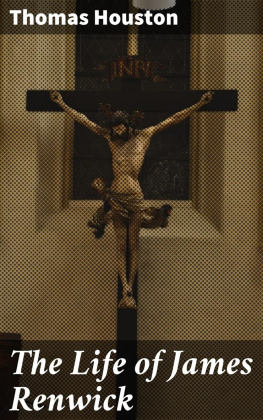HISTORICAL INTRODUCTION.
Table of Contents
The prophet's message to Eli, "Wherefore the Lord God of Israel said * * * THEM THAT HONOUR ME, I WILL HONOUR," (1 Sam. ii. 30,) declares a fundamental law of the divine government, which the history alike of individuals and of communities has illustrated in all by-past ages. The works of many men of eminent talent and remarkable energyadmired in their own dayhave speedily passed into oblivion, or have been productive of few permanently salutary results. Despising God, "they have been lightly esteemed." Those, on the other hand, who honoured God, and were devoted to His servicehowever humble their talents or position in societyhowever contemned and persecuted by the worldhave been honoured of God. Their labours have been accepted to advance His glory in the earththeir memories have continued long fragrant, and their principles and character have furnished the most valuable instruction and the brightest examples to future generations.
Of this we have a striking instance in JAMES RENWICKthe last, and in various respects the most illustrious of the Scottish martyrs of the seventeenth century. Hated and persecuted in his own day, by the men in authority in Church and Statecaluminated and reproached by ministers and others, who professed evangelical sentiments and affected pietyand his principles generally misrepresented and condemned even to our own daythere is yet abundant evidence to show that the Master whom he faithfully served, and for whose cause he willingly surrendered his life, singularly owned and honoured him. His faithful contendings and arduous labours contributed not a little to subvert the throne of a bigot and tyrant, and to achieve the nation's liberties. They served also to secure the purity and independence of the Church, and to transmit a legacy of imperishable principles to future times, when "the handful of corn" upon the top of the mountains, "shall shake with fruit like Lebanon." Scant and fragmentary as are the memorials of Renwickclothed in the most homely garb, and written with no artistic skill, they have yet been the means of nurturing vital piety in many a humble breast and household, in these and other countries, from the martyr era, to our own day; and not a few of the most devoted ministers, who have earnestly contended for precious truth, and been wise to win souls to Christ, have received from the record of the labours and sufferings and testimony of Renwick, some of their first solemn impressions for good, and propelling motives to holy diligence and self-devotion. As the story of Joseph in the Old Testament has been remarkably blessed, above other parts of the divine word, for promoting the conversion and early piety of the young, so the unadorned narrative of the life, labours, and death of the youthful Scottish martyr, has led not a few to prefer the cause and reproach of Christ to the world's favourto imbibe his spirit, and to imitate him, in seeking ends the most important and glorious.
Renwick's work in the Church is not yet fully accomplished, nor is the influence of his name losing its attractive power. On the contrary, there is evidence, increasing as it is cheering, that while the one is drawing to it more earnest regard and willing workers, the other is constantly becoming more powerful and widespread. Let any person compare the manner in which the later Scottish martyrsRenwick and the Society peoplewere spoken of in the histories, civil and ecclesiastical, emitted in these countries, forty or fifty years ago, with the altered tone of historians of a recent date, and he will see that posterity is beginning to do tardy justice to the memories of men of whom "the world was not worthy," who were the noblest, most disinterested patriots of which their country could ever boast, and whose services to the cause of pure and undefined religion were invaluable. Occasionally, we yet find, in the works of some popular writers, Renwick and his fellow-sufferers, designated enthusiasts and fanatics, their principles misrepresented, and some of their most heroic deeds held up to ridicule and scorn. Even the brilliant Macaulay, while exposing to deserved condemnation their cruel and heartless persecutors, and while depicting with graphic power some of the incidents of the deaths of the Scottish martyrs, yet shews his strong aversion to evangelical principle and godly practice, by applying to the honest confessors the same opprobrious epithets. The age in which the martyrs and their principles were kept entombed, by heaping on them reproach and slander, is past, however, not to return again. Their names are destined not to perish. God designs in his providence to honour them more and more, by bringing more clearly to light the great principles for which they contended unto blood, striving against sin. The era long predicted and desired is approaching, when the saints shall rise to reign with Christ on the earth, when the spirit which distinguished them shall be extensively revived, and the great principles of their testimony shall be triumphant.
Meanwhile, the resurrection of the names of the confessors and martyrs of a former age, is a sure indication of the resurrection of their principles too. Through the evidence furnished by the faithful contendings and devoted lives of men of sanctified wisdom and high-toned piety, and the light reflected from the story of their sufferings and triumphant deaths, we cannot doubt that numbers will be led to earnest inquiry concerning the principles for which they testified in life, and in confirmation of which they willingly laid down their lives, that they might transmit the precious heritage to future generations. The result will be a wider appreciation of the value and excellency of a martyr-testimony; and in the period of promised light and enlargement, the lifting up of a standard in many places, and by strong hands, in behalf of the same great principles.
As prefatory to the memorials of the piety, wisdom, and devotedness of the martyr Renwick, it appears desirable to present a brief sketch of his personal historyto notice the particular time in which he laboured, and the principles for which he contendedhis martyrdom, character, and the distinct and honourable position assigned him in the great work of maintaining and advancing the Redeemer's cause in the earth.
RENWICK'S LIFE
Table of Contents
James Renwick was the child of godly parents in humble life. His father, Andrew Renwick, was a weaver, and his mother, Elizabeth Corson, is especially mentioned, like the mother and grandmother of Timothy, or like Monica, the mother of Augustine, as a woman of strong faith, and eminently prayerful. As several of her children had died in infancy, she earnestly sought that the Lord would give her a child, who would not only be an heir of glory, but who might live to serve God in his generation. Her prayer was heard and graciously answered. The son of her vows was born at Moniaive, in the parish of Glencairn, Gallowayshire, on the 15th of February, 1662. His father died before he reached the age of fourteen, but not before he felt assuredprobably from observing in the boy remarkable indications of early pietythat, though his course on earth would be short, the Lord would make singular use of him in his service. The early training of this distinguished martyr was, in a great measure, through the instrumentality of a devoted mother, who could boast of no worldly affluence or accomplishments, but whose heart was richly pervaded by the grace of the Spirit, and intensely concerned for the Saviour's glory; and who, in times of great difficulty and great trial, maintained unwavering confidence in the faithful word of promise.













